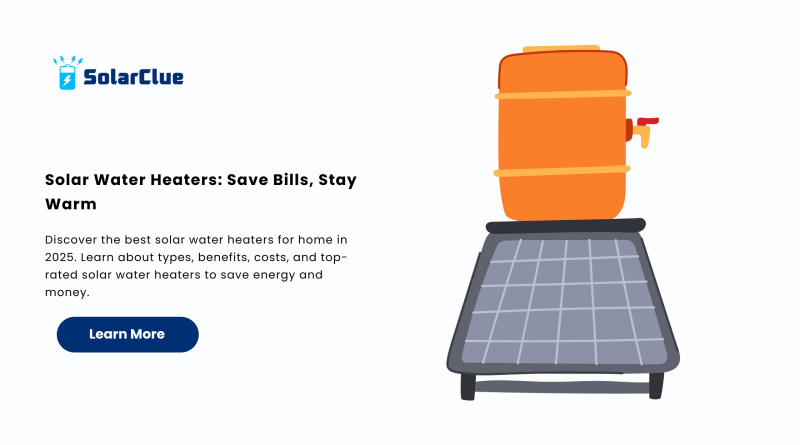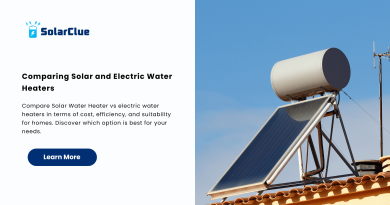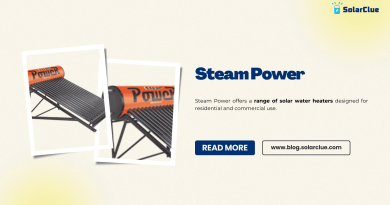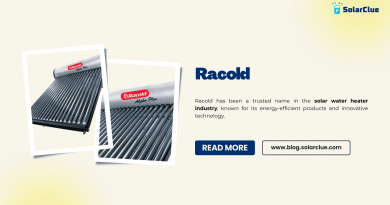Solar Water Heaters: Save Bills, Stay Warm
In a country like India where sunshine is abundant and electricity bills are rising, solar water heaters are becoming a household essential. These systems not only reduce your power consumption but also offer an eco-friendly way to enjoy hot water throughout the year. In this blog, we explore how to choose the best solar water heaters for home, compare types, evaluate benefits, and guide you toward smarter energy use.
Table of Contents
- 1 Why Choose Solar Water Heaters in 2025
- 2 Benefits of Solar Water Heaters
- 3 Types of Solar Water Heaters
- 4 Factors to Consider When Buying Solar Water Heaters
- 5 Best Solar Water Heaters for Home in 2025
- 6 Installation and Maintenance
- 7 Cost and Savings
- 8 Government Subsidies
- 9 Real-Life Success Story
- 10 Common Myths About Solar Water Heaters
- 11 Expert Tips Before Buying
- 12 FAQs
Why Choose Solar Water Heaters in 2025
Solar water heaters work by converting sunlight into thermal energy, heating water for residential use. With technological advancements in 2025, today’s models are more efficient, compact, and easier to maintain than ever. Choosing solar water heaters for home ensures long-term savings on electricity or LPG costs while contributing to environmental conservation.
Benefits of Solar Water Heaters
- Energy savings: Save up to 70% on water heating bills.
- Low maintenance: Modern water heaters are easy to clean and built for long-term use.
- Eco-friendly: Reduce carbon emissions with every use.
- Independent operation: Works even during power outages.
Types of Solar Water Heaters
Understanding the types of solar water heaters is key to making the right choice:
1. Flat Plate Collector (FPC)
These best solar water heaters use flat metallic collectors that absorb sunlight. They are best suited for areas with hard water and can withstand high pressure, making them ideal for multi-story buildings.
2. Evacuated Tube Collector (ETC)
ETC heaters use glass tubes for faster and more efficient heat transfer. They’re more economical and perform better in colder regions, making them popular in northern states of India.
Factors to Consider When Buying Solar Water Heaters
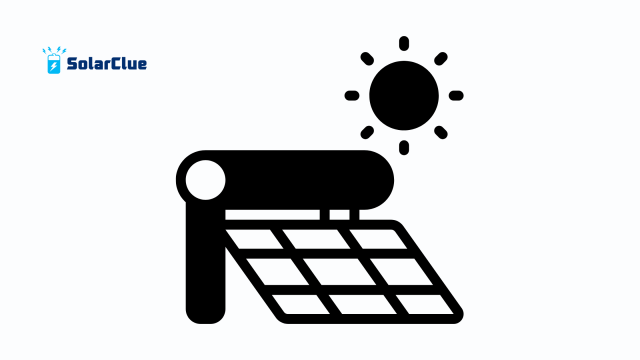
1. Capacity
The capacity of your solar water heater should depend on your family size. For instance, a family of 4 typically needs a 200-liter system.
2. Water Quality
If your region has hard water, FPC systems are more durable. For soft water, ETC systems can be a budget-friendly choice.
3. Roof Space and Orientation
Install your solar water heaters on a south-facing rooftop for optimal performance. Ensure sufficient space and sunlight exposure.
4. Backup Heating
Choose models with electric backup heating for cloudy or rainy days.
Best Solar Water Heaters for Home in 2025
Here are some of the best solar water heaters available in India:
V-Guard Win Hot Series
Known for reliability and performance, especially in colder climates.
Racold Alpha Pro
Offers smart features like auto-cut-off and high energy efficiency.
Supreme Solar
Well-suited for hard water areas with robust steel tank construction.
Havells Solero
Stylish design, quick heating, and digital display options.
Installation and Maintenance
Installing solar water heaters for home is a straightforward process. It typically takes less than a day and includes mounting the collector panels on the roof and connecting them to your water line. Regular maintenance includes cleaning the collector surface every 2–3 months and checking for leaks or sediment buildup.
Cost and Savings
A typical 200-liter solar water heater for a family of four costs between ₹18,000 to ₹35,000. Thanks to savings on LPG or electricity, most homeowners recover the cost within 2–3 years.
| Capacity | Price Range | Ideal for |
|---|---|---|
| 100 LPD | ₹10,000–₹18,000 | 1–2 people |
| 200 LPD | ₹18,000–₹30,000 | 3–4 people |
| 300 LPD | ₹28,000–₹40,000 | 5–6 people |
Government Subsidies
Subsidies are available through MNRE (Ministry of New and Renewable Energy) and state agencies. You can receive up to 30–40% of the system cost back when you purchase from an approved vendor.
Real-Life Success Story
Mrs. Mehta from Bengaluru installed a 200 LPD Racold Alpha Pro system in early 2024. With four family members, she used to spend ₹600 per month on electricity for water heating. Now, she spends zero—and the system paid for itself in less than 2.5 years. “It’s low maintenance and dependable,” she says, “plus, it feels good to go green.”
Common Myths About Solar Water Heaters
Myth 1: They don’t work in monsoon.
Truth: They include electric backups and retain heat for hours.
Myth 2: Maintenance is expensive.
Truth: Routine cleaning and inspection are inexpensive and infrequent.
Myth 3: Water isn’t hot enough.
Truth: With proper installation, water can reach up to 60–80°C.
Expert Tips Before Buying
- Compare prices and warranty before purchasing.
- Choose the right size based on family size and usage.
- Ensure installation by trained professionals.
- Ask about electric backup and support.
- Always register for subsidies if eligible.
FAQs
1. What is the life expectancy of solar water heaters?
Around 10–15 years with basic care.
2. Do they work in cold climates?
Yes, especially FPC types with insulated tanks.
3. Can I use solar water heaters with pressure pumps?
Yes, choose pressurized models compatible with boosters.
4. Is hard water an issue?
No, if using stainless steel or copper tank models.
5. Are solar water heaters safe?
Absolutely—they include temperature and pressure controls.
Still deciding if a solar water heater is right for you? Visit solarclue.com to browse the best options for your home and family. For installation tips, reviews, and real customer experiences, check out blog.solarclue.com—we’re here to make your sustainable switch smooth and smart!

